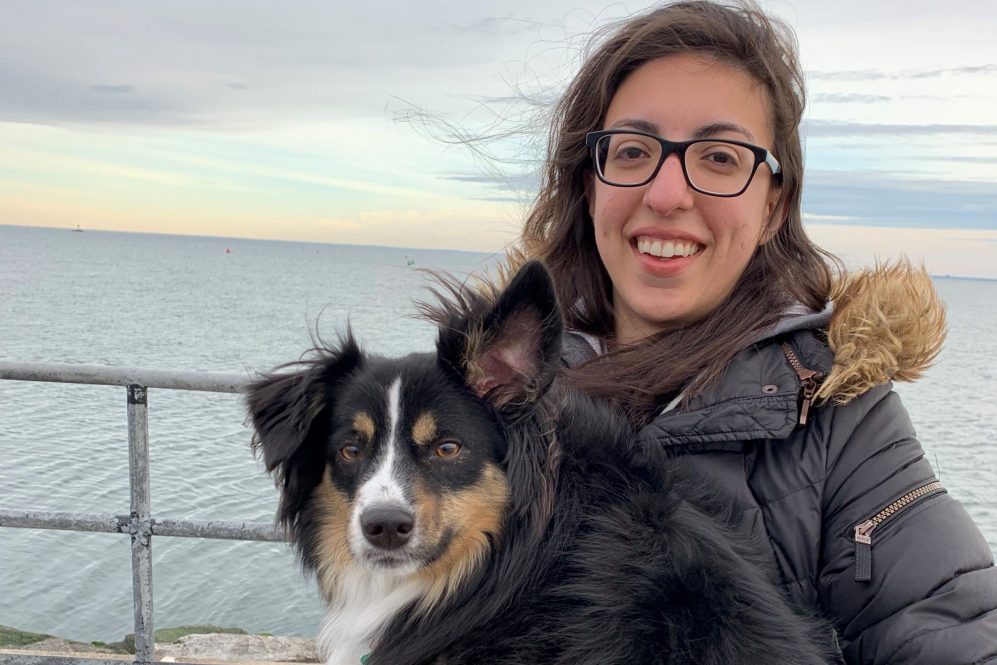This article originally appeared on CAHNR Newsroom.
By Maria Buzzelli.
Gabriella Sulpizi, a recent graduate of the animal science major, was involved in various research projects as well as extracurricular activities during her time at UConn. She has worked in many animal science labs studying a range of topics from neuroscience to working with sheep. She was also the president of Alpha Zeta, the professional society for CAHNR students. Read below about her plans for post-graduation and how COVID-19 has affected her studies in this week’s student profile.
What attracted you to the UConn College of Agriculture, Health and Natural Resources?
With such a wide variety of animal species, faculty that truly cares about their students and extensive opportunities to get involved in research, UConn CAHNR was my number one school choice.
Why did you choose your particular major?
UConn has a top-tier animal science program with countless hands-on opportunities. Majoring in animal science was an obvious choice for me, since I had always wanted to be a veterinarian. My passion for animals and science has only grown stronger throughout my time at UConn. I was considering laboratory animal medicine as a vet. However, my strong desire to become a veterinarian has evolved. After discussions with my advisor, Dr. Milvae, and attending seminar class, moving up the ranks at a research or pharmaceutical company is something I am now looking into. I became particularly fascinated with chemistry early on at UConn, so I decided to pursue a chemistry minor. This minor will aid in my future career endeavors.
Which one of your UConn activities, internships or jobs was the most memorable? Why?
My time in the Govoni lab has been the most memorable. Getting to watch the sunrise as I drive to the sheep barn for research activities has been memorable, along with making new friends and writing and receiving a grant. Working in the lab has given me a passion for protocol optimization and conveying research findings in an effective manner. As part of my research experience, I had the opportunity to participate in Journal Club. In this club I worked with graduate students and professors to discuss and analyze various scholarly journal articles. We discussed experimental methodology, results, significance and any flaws in the protocols of these studies. All of the research papers we analyzed were related to restricted maternal nutrition in sheep, which is something we are currently studying in the animal science department.
Name two other experiences that have enriched your studies.
Participating in Alpha Zeta, UConn’s CAHNR honor society, is one way I have connected with my peers and formed lasting friendships. My title has gone from member to treasurer to president to mentor. Alpha Zeta has given me leadership skills such as communication, management, public speaking and delegation. I have enjoyed getting members excited about agriculture, giving back to the community and hearing about the wonderful experiences and ideas members have.
During my sophomore year, I started participating in sensory perception and neuroscience research in the [Heather] Read lab [in the Department of Psychological Sciences]. This lab is geared towards improving auditory therapies and cochlear implants by testing sound discrimination abilities in rats. Through this experience, I discovered how lab animals are cared for, housed, and used in a research setting. This research experience gave me a foundation to work with when I joined the Govoni lab.
What has been the biggest challenge in your UConn career?
Currently, I am taking biochemistry and have found it to be challenging. Balancing my time this semester has been especially difficult while also taking rigorous courses. I am not good at planning, so I spent a lot of time at the beginning of the semester writing out a large calendar and that has definitely helped me manage everything!
When do you expect to graduate? What then?
I graduated in December 2020, one semester early thanks to AP classes in high school. After I graduate, I am planning to get a job at a research or pharmaceutical company. Working as a laboratory technician or research assistant seems like an attainable goal, since I do not have a masters or Ph.D. Recently, I also discovered the Medical Laboratory Sciences program in the Department of Allied Health Sciences, and I am thinking about applying. Additionally, I applied to vet schools this cycle, so I will have the option to either go to vet school or pursue a career at a research or pharmaceutical company.
Has the COVID-19 pandemic affected your studies or research?
COVID-19 has added a layer of challenges to many aspects of life. I had two in-person labs, but both had only four students in them, which allowed for ample social distancing. Also, my weekly research lab meetings have been virtual. Rather than presenting my research in person at Frontiers, I recorded myself presenting my project. Then, I uploaded that video along with a research poster to Portfolium. With respect to Alpha Zeta, our meetings are now virtual to keep members connected, but we are unable to participate in our weekly volunteering at Spring Valley Student Farm due to the pandemic.
Is there anything else you would like us to know about you?
I have a variety of other interests such as go karting, teaching myself how to play the guitar and enjoying nature while fishing. Finding a balance between school and things I love to do has been important for me.



